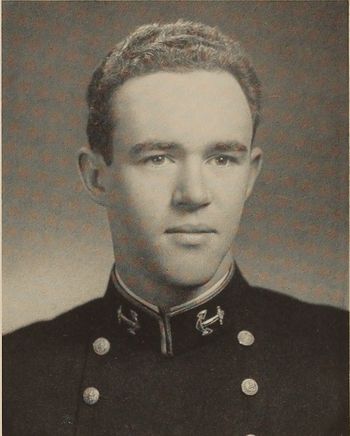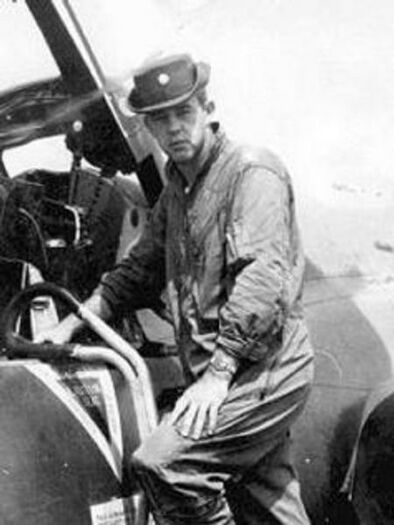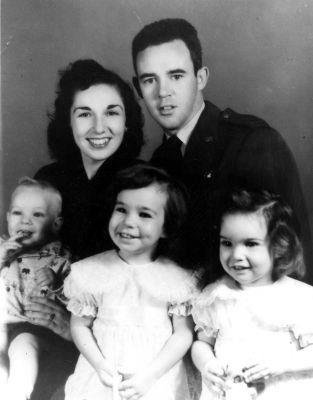JOHN F. O'GRADY, COL, USAF
John O'Grady '52
Lucky Bag
From the 1952 Lucky Bag:
John Francis O'Grady
New Hyde Park, Long Island, New York
Meet John Francis "Patrick" O'Grady. John awakened to sports one day in his youth and promptly ran off in all directions. He has been running ever since. A graduate of La Salle Military Academy and the Sullivan School, Ekom, possessed when he came to Navy, a singular lack of regard for authority. Strictly a one-woman man, John Francis spent his time in writing those special letters and in running. Lettering in cross-country and track occupied his afternoons. Struggles with various academic departments and his duties as company representative and member of the Executive Committee cut into his evenings. The rest of his time John devoted to the Executive Department.
He was also Brigade Boxing Champion (165 lb).

John Francis O'Grady
New Hyde Park, Long Island, New York
Meet John Francis "Patrick" O'Grady. John awakened to sports one day in his youth and promptly ran off in all directions. He has been running ever since. A graduate of La Salle Military Academy and the Sullivan School, Ekom, possessed when he came to Navy, a singular lack of regard for authority. Strictly a one-woman man, John Francis spent his time in writing those special letters and in running. Lettering in cross-country and track occupied his afternoons. Struggles with various academic departments and his duties as company representative and member of the Executive Committee cut into his evenings. The rest of his time John devoted to the Executive Department.
He was also Brigade Boxing Champion (165 lb).
Loss
John was killed in action on or about April 10, 1967 when his F-105D jet was shot down over North Vietnam. He ejected from the aircraft, but no contact was made with him afterwards. He was a Major, but promoted while held in a "missing" status until officially declared dead in 1977.
From the now-defunct website "John O'Grady POW-MIA":
On April 10, 1967, the NVA 280th Air Defense Unit of the North Vietnamese Army hit Major O'Grady's F-105D with intense ground fire as he flew over the Mu Gia Pass - one of the most heavily defended targets in North Vietnam. John O'Grady struggled to maintain control of his aircraft.
With the plane on fire, he raced toward the border of Laos hoping to increase the likelihood he would be recovered. If he ejected too close to the NVA air defense regiment, there was little hope of escape.
So he took his chances and rode the crippled aircraft about two miles beyond the target. He stayed with it as long as possible without any hydraulic control before he finally pushed the ejection button.
However, on that long ago day the wind blew his parachute back toward the Pass to certain capture.
As the senior pilot in the air that day stated, "But for the way the wind blew that day, Major O'Grady may not have been left in the mountains of Vietnam..."
In four short months in Vietnam, John O'Grady, a USN Academy graduate, earned the Silver Star, two Distinguished Flying Crosses, two Bronze Star Medals, and a Purple Heart.
Biography
John O'Grady was born on August 31, 1929 in New Hyde Park, New York to Irish immigrants. He attended La Salle High School Military Academy. He attained the top ranking of his class and reached the top ten of all students attending H.S. Military Academies across the United States. His incredible academic achievements earned him an automatic appointment to Annapolis; “The United States Naval Academy.”
He majored in Aeronautical Engineering and graduated with honors at the top of his class in 1952. He served in the United States Air Force with excellence, and in addition to being an engineer he also became a jet fighter pilot. Later O'Grady earned his Masters Degree in Aeronautical engineering at Rensselaer Polytechnic Institute.
O'Grady was a heavy weight champion boxer and a track star at Annapolis. He loved flying and earned his pilot license at 14 years old even before he was able to drive. He was a tall man standing 6'3' in bare feet, he had brown very curly hair, and hazel eyes with a hint of Irish green. He was highly intelligent, very athletic and a devoted uncle, father, son and husband. He had high moral standards and lived his life with great integrity, and had a strong faith in God and his country.
He married his high school sweetheart, Diana Pascale, in 1952 and over the next 14 years they had seven children. O'Grady was a very loving and involved dad. He embodied compassion and strength and as a father utilized strict but gentle discipline. He lived life to the fullest and savored each moment. He had an incredible zest for living and he instilled his passion for life and learning into his children.
As an Air Force family the O'Grady's relocated every couple of years, but the Colonel worked hard to ensure easy transitions with as little disruption to the children's lives as possible. They moved with the precision, discipline and strength of a typical military family. When the family would settle into their new neighborhood, he would encourage his children to make the best of their situation, by making new friends, getting involved in sports and other activities and by working hard to succeed.
Colonel O'Grady loomed large among his family as his career reached amazing pinnacles. In addition to his Masters Degree in Engineering, he had specialized training and expertise in the anti-ballistic weapons systems on the F-4 aircraft that he helped to design. O'Grady also worked on the Saturn and Jupiter rocket booster system at Redstone Arsenal in Huntsville, Alabama, that put the first monkeys into space.
He could also be a free spirited child at heart, One childhood memory, I recall, that exemplifies this trait was when he dressed up at Halloween as the Great Pumpkin, with his homemade costume he would go out and surprise all the neighborhood kids. He played games with us, took us on nature walks, read stories to us and taught us many lessons of life and living. He taught his children manners and to respect others, and he encouraged us to explore, learn, teach, achieve, question and seek answers. Most importantly he lived his life in an exemplary manner which his children tried to emulate.
Another memory is at Christmas, he would lead all 7 children in a great rendition of the song 'The Little Drummer Boy' using instruments, he would conduct the family orchestra. I can recall when it snowed, while we were living in Maryland, him taking all the kids, even the neighborhood kids, on the sled down the steep hill we lived on. He was a hands on Dad!
John O'Grady left behind grieving parents, a lost and lonely wife, seven confused and desperate children, and many friends and relatives that missed him greatly. Later, he would go on to have 19 grandchildren, that sadly will never know how awesome their grandfather was. Yet, each O'Grady grandchild carries on his legacy by living their lives with great courage and inner strength. They inherited his great work ethic and have each achieved great success in their own lives. TARA O'GRADY, TARALOGRADY@GMAIL.COM, 5/3/13
Career
From Veteran Tributes:
John O'Grady was born on August 31, 1929, in Brooklyn, New York. He entered the U.S. Naval Academy in June 1948, and was commissioned a 2d Lt in the U.S. Air Force on June 3, 1952. Lt O'Grady served as a Production Procurement Officer with Headquarters San Antonio Air Material Area at Kelly AFB, Texas, from June to October 1952, and then attended pilot training and was awarded his pilot wings at Foster AFB, Texas, in November 1953.
He next attended Advanced Pilot Training in the F-84 Thunderjet from November 1953 to February 1954, followed by service as a Ferry Pilot with the 1737th Ferry Squadron at Dover AFB, Delaware, from March 1954 to December 1956. Capt O'Grady received an Air Force Institute of Technology assignment to complete the Aircraft Structural Design Course from December 1956 to October 1957, and then served as an Aeronautical Engineer with Headquarters Mobile Air Material Area at Brookley AFB, Alabama, from October 1957 to May 1960.
His next assignment was as a Project Engineer and Project Chief on the PGM-19 Jupiter Medium-Range Ballistic Missile Office at Redstone Arsenal in Huntsville, Alabama, from May 1960 to June 1962, followed by another Air Force Institute of Technology assignment to complete his Master's degree in Engineering Management at Rensselaer Polytechnic Institute in Troy, New York, from June 1962 to July 1963. Maj O'Grady served as a Research and Development Officer, Management Analysis Officer, and Aerospace Programs Officer with Headquarters Air Force Systems Command at Andrews AFB, Maryland, from July 1963 to July 1966, and he then attended F-105 Thunderchief Combat Crew Training from July to December 1966.
He deployed to Southeast Asia in January 1967, where he served as an F-105 pilot with the 357th Tactical Fighter Squadron at Takhli Royal Thai AFB, Thailand, from January 1967 until he was forced to eject over North Vietnam on April 10, 1967.
It is believed that Maj O'Grady was immediately captured and then died the same day he was shot down, but he was officially listed as Missing in Action, being promoted through the ranks to Colonel, before he was declared dead on March 15, 1977. His remains have never been returned to the United States.
Photographs
Remembrances
From Wall of Faces:
Last letter written by Colonel John F. O'Grady while serving in Vietnam
Colonel O'Grady had seven children and just before he was shot down over North Vietnam he wrote a letter to his youngest daughter, Tara O'Grady.
This is an exact excerpt from the letter he wrote to his 6 year old daughter:
"Daddy is flying a lot and the more he flies the sooner he will be home for good and that's what he wants more than anything else in the world so he can give out great big hugs and kisses to everyone, especially to little girls in the first grade." TARA O'GRADY, 8/15/14
I was only five years old when my father left to serve in Vietnam and barely six when his plane was shot down and he went missing. Yet, I remember my father with great clarity and vividness as the connection between us ran deep. My small world revolved around him, he was my Knight in Shinning Armour. I can clearly recall the thrill I experienced at the prospect of any precious moments I was able to spend with my dad. Even the trivial things were special when I shared them with him. A ride to kindergarten, a walk, a bedtime story or a sleigh ride with my father ignited the same spark and enthusiasm as a new bike or a trip to Disneyland. I recollect each day waiting impatiently for his arrival home from work. I could barely contain my excitement upon his arrival, rushing to the door to greet him, it was the highlight of my day and stirred tremendous joy within me every time. As his youngest daughter; I epitomized the term; “Daddy’s Little Girl” TARA O'GRADY, 10/7/12
You were a special and caring person and a huge hero of war. I salute you colonel. Love you forever. I will never forget you grandpa. DAVID BAKER, DARKPHEONIX2006@YAHOO.COM, 1/9/04
Family
From The Search for John O'Grady by Sydney H. Schanberg, Published in New York Newsday on August 1, 1993:
They met at a tea dance, arranged by their respective Catholic private schools on Long Island — Our Lady of Mercy Academy in Syosset and La Salle Military Academy in Oakdale. “Usually the nuns and brothers lined you up and matched you up,” Diana recalled, “but I was on the dance committee, so I had a little influence and being on the short side, I wanted somebody tall, and also with a nice name, so I said, ‘I’ll take this one.'” She laughed lightly at the memory of her connivance.
“This one” was John Francis O’Grady, a fearless boy who got his pilot’s license at 14 before he was eligible to drive a car. On the bus back to Our Lady of Mercy, Diana Pascale told her best friend, Kathleen, that she was going to marry him. He was 16, she 15. He was an inch or two over six feet, she stood a foot shorter. He was her first date. They married six years later, in 1952, when he was in his final year at Annapolis.
And then, 15 years, seven children and 12 household moves after that, she lost him. His plane was hit on his 31st bombing mission over North Vietnam. He parachuted into the jungle and became a disappeared person, missing in action, fate unknown.
Three years passed with no news and she found she couldn’t stand it. She needed a resolution. Washington was still carrying her husband as just missing – neither alive as a prisoner nor dead. So she made up her mind to go to Paris, site of the fitful Vietnam peace talks, to confront the North Vietnamese. At about this time, late 1969, a story about her situation ran in Look magazine. It evoked thousands of supportive letters — and tangible commitments from Howard Hughes and Ross Perot to take care of the Paris trip. Diana and all seven children, ages 5 to 17, arrived in the French capital in February of 1970. The North Vietnamese in Paris had rebuffed other MIA wives, but they agreed, reluctantly, to see Diana O’Grady – probably because of the response generated by the magazine article. She and the children went to Hanoi’s embassy. There she was told that “your husband is not in our camps.” Does that mean, she pressed on, that he is dead?
Their reply was cold: “That’s something for your government to tell you.”
Diana O’Grady says she left that meeting believing that the Vietnamese had told her, without saying the words, that her husband was dead. But some of her children were not so sure. “The Vietnamese didn’t say our father was dead,” says daughter Diana Bright, now 35 (known then as “Little Diana”). “But my mother wanted it over. She didn’t want it left hanging. I think she had a sense of guilt about dating. She had a need to hear that he was dead — to make it okay for her to have a personal life.”
Diana O’Grady herself, recalling that time, says, “All the indications were that he was dead. I decided I had to get on with life.”
Her son Terrance, now 36, remembers his mother saying to the seven children after Paris: “If your father comes back, it’s gravy, it’s aspecial gift. But we can’t stay in limbo, we’ve got to move on.”
Other Information
From researcher Kathy Franz:
The December 30, 1969 issue of Look magazine carried an article "The Tense Vigil of Mrs. O'Grady." Her husband John, an Air Force Major, went down over North Vietnam 32 months ago, and his fate is still unknown.
John's father, also named John, was a business agent for the Wine & Liquor Clerks Union who later became president manager of Local 122. John's mother was Frances V. (Brown.)
There is an article from The Los Angeles Times on July 17, 1993 that details some of the efforts on behalf of his family to find out what happened to John.
Awards
Unable to find citations for the Silver Star, Bronze Stars, or Distinguished Flying Crosses mentioned above.
Related Articles
Robert Allison '52, Frederic Davis '52, Raymond Tacke '52, Charles Andrews, III '52, and John Ellison '52 were also on the track team.
Raymond Tacke '52 was also on the cross country team.

The "category" links below lead to lists of related Honorees; use them to explore further the service and sacrifice of alumni in Memorial Hall.

